විචිත්ර වූ වසන්ත මහෝත්සවය Chinese New Year
දැන් අපි චීන දින දසුන ගැනත් කාලය නිරූපණය කිරීමේ රාශිචක්රය ගැනත් මූලික කරුණු දන්නවා. ඒ නිසා අපිට පුළුවන් චීනයේ සංස්කෘතික මහෝත්සව ගැන නිරවුල්ව කතා කිරීමට. මේ කතාවේදී මූලිකත්වය දිය යුත්තේ වසර ආරම්භය සනිටුහන් කරන වසන්ත මහෝත්සවයට. මෙවර ලිපිය වෙන් වන්නේ ඒ ගැන විමසා බැලීමටයි.
පළමු චන්ද්ර මාසයේ පළමු දිනය දා චීනයේ නව වසර සමරනවා. ශීත කාලය අවසන්ව වසන්තයේ උදාවත් සමගම යෙදෙන බැවින් මෙය වසන්ත මහෝත්සවය ලෙසින් හැඳින්වෙනවා. මේ තමයි චීන ජනතාව විසින් මහත් වූ උනන්දුවෙන් උත්කර්ෂවත් ලෙස සමරන වැදගත් ම ජාතික උත්සවය. ඒ නිසා මෙම උත්සවය සඳහා සූදානම් වීම බොහෝ කල් ඇතිව කළ යුතු දෙයක්. සාම්ප්රදායික පිළිගැනීමට අනුව මේ සූදානම් වීමේ කාර්යය ඇරැඹෙන්නේ දොළොස්වන චන්ද්ර මාසයේ 23 වනදා සිට. ඒ දිනයේදී චීන ජනතාව නව වසර වෙනුවෙන් තම තමන්ගේ නිවාස පිරිසිදු කිරීම ආරම්භ කරනවා.
ඒක තමයි නව වසරේ උදාව වෙනුවෙන් සිදු කරන පළමු කටයුත්ත. එයින් පසුව, නව වසර වෙනුවෙන් රෙදිපිළි, අනෙකුත් අඩුම කුඩුම ගැනීම සඳහා කළ යුතු සාප්පු සවාරි අරඹනවා. කඩදාසි ලියකම්වලින් තම නිවෙස්වල ජනෙල් වීදුරු සැරසීම එයින් පසුව කෙරෙනවා. (මේ කඩදාසි ලියකම් කියන්නේ වෙනම කතා කළ යුත්තක්) ඒ විතරක් නෙවෙයි, නව වසර වෙනුවෙන්ම එළියට එන චිත්රවලින් ගෙවල් සැරසෙනවා. චාරුලේත දෙපද කවි වැලෙන් දොර දෙපස සැරසෙනවා. නව වසර වෙනුවෙන් කැවිලි තැනෙනවා. මේ හැම දෙයක්ම කෙරෙන්නේ එළැඹෙන නව වසර පිළිගන්aන. (සිංහල අවුරුද්දදට සැරසෙන අපට මේ ගැන යම් හැඟීමක් ඇති කරගන්න එක ඒ තරම් අමාරු දෙයක් නෙවෙයි)
Chinese New Year is the most important of the traditional Chinese holidays. In China, it is known as 'Spring Festival', the literal translation of the Chinese name 春節 (Pinyin: Chūnjié), since the spring season in Chinese calendar starts with lichun, the first solar term in a Chinese calendar year. It marks the end of the winter season, analogous to the Western Carnival. The festival begins on the first day of the first month (Chinese: 正月; pinyin: Zhēngyuè) in the traditional Chinese calendar and ends with Lantern Festival which is on the 15th day. Chinese New Year's Eve, a day where Chinese families gather for their annual reunion dinner, is known as Chúxī (除夕), literally "remove evening" or "Eve of the Passing Year." Because the Chinese calendar is lunisolar, the Chinese New Year is often referred to as the "Lunar New Year" and Agriculture / Agricultural / Agrarian Calendar's New Year.
Chinese New Year is the longest and most important festivity in the Chinese calendar. The origin of Chinese New Year is itself centuries old and gains significance because of several myths and traditions. Chinese New Year is celebrated in China and in countries and territories with significant Chinese populations, including Hong Kong,[2] Macau, Singapore,[3] Thailand, Indonesia, Malaysia, Taiwan, Mauritius,[4] Philippines,[5][6] and also in Chinatowns elsewhere. Chinese New Year is considered a major holiday for the Chinese and has had influence on the lunar new year celebrations of its geographic neighbors.
Within China, regional customs and traditions concerning the celebration of the Chinese new year vary widely. People will pour out their money to buy presents, decoration, material, food, and clothing. It is also traditional for every family to thoroughly cleanse the house, in order to sweep away any ill-fortune and to make way for good incoming luck. Windows and doors will be decorated with red colour paper-cuts and couplets with popular themes of "good fortune" or "happiness", "wealth", and "longevity." On the Eve of Chinese New Year, supper is a feast with families. Food will include such items as pigs, ducks, chicken and sweet delicacies. The family will end the night with firecrackers. Early the next morning, children will greet their parents by wishing them a healthy and happy new year, and receive money in red paper envelopes. The Chinese New Year tradition is to reconcile, forget all grudges and sincerely wish peace and happiness for everyone.
Although the Chinese calendar traditionally does not use continuously numbered years, outside China its years are often numbered from the reign of the Yellow Emperor. But at least three different years numbered 1 are now used by various scholars, making the year beginning in 2012 CE the "Chinese Year" 4710, 4709, or 4649.[7]
Preceding days
On the eighth day of the lunar month prior to Chinese New Year, a traditional porridge known as làbāzhōu (臘八粥) is served in remembrance "of an ancient festival, called Là, that occurred shortly after the winter solstice".[11] Làyuè (臘月) is a term often associated with Chinese New Year as it refers to the sacrifices held in honor of the gods in the twelfth lunar month, hence the cured meats of Chinese New Year are known as làròu (臘肉). The porridge was prepared by the women of the household at first light, with the first bowl offered to the family's ancestors and the household deities. Every member of the family was then served a bowl, with leftovers distributed to relatives and friends.[12] It's still served as a special breakfast on this day in some Chinese homes.
On the days immediately before the New Year celebration, Chinese families give their home a thorough cleaning. There is a Cantonese saying "Wash away the dirt on ninyabaat" (年廿八,洗邋遢), but the practice is not restricted to nin'ya'baat (年廿八, the 28th day of month 12). It is believed the cleaning sweeps away the bad luck of the preceding year and makes their homes ready for good luck. Brooms and dust pans are put away on the first day so that the newly arrived good luck cannot be swept away. Some people give their homes, doors and window-frames a new coat of red paint; decorators and paper-hangers do a year-end rush of business prior to Chinese New Year.[13] Homes are often decorated with paper cutouts of Chinese auspicious phrases and couplets. Purchasing new clothing, shoes, and receiving a hair-cut also symbolize a fresh start. Businesses are expected to pay off all the debts outstanding for the year before the new year eve, extending to debts of gratitude. Thus it is a common practice to send gifts and rice to close business associates, and extended family members.
In many households where Buddhism or Taoism is prevalent, home altars and statues are cleaned thoroughly, and altars that were adorned with decorations from the previous year are taken down and burned a week before the new year starts, to be replaced with new decorations. Taoists (and Buddhists to a lesser extent) will also "send gods" (送神, sòngshén), an example would be burning a paper effigy of Zao Jun the Kitchen God, the recorder of family functions. This is done so that the Kitchen God can report to the Jade Emperor of the family household's transgressions and good deeds. Families often offer sweet foods (such as candy) in order to "bribe" the deities into reporting good things about the family.
Prior to the Reunion Dinner, a thanksgiving prayer offering to mark the safe passage of the previous year is held. Confucianists take the opportunity to remember the ancestors, and those who had lived before them are revered.
The biggest event of any Chinese New Year's Eve is the Reunion Dinner. A dish consisting of fish will appear on the tables of Chinese families. It is for display for the New Year's Eve dinner. This meal is comparable to Christmas dinner in the West. In northern China, it is customary to make dumplings (jiaozi, 餃子, jiǎozi) after dinner to eat around midnight. Dumplings symbolize wealth because their shape resembles a Chinese tael. By contrast, in the South, it is customary to make a glutinous new year cake (niangao, 年糕, niángāo) and send pieces of it as gifts to relatives and friends in the coming days of the new year. Niángāo [Pinyin] literally means "new year cake" with a homophonous meaning of "increasingly prosperous year in year out".[14] After dinner, some families go to local temples hours before the new year begins to pray for a prosperous new year by lighting the first incense of the year; however in modern practice, many households hold parties and even hold a countdown to the new year. Traditionally, firecrackers were once lit to scare away evil spirits with the household doors sealed, not to be reopened until the new morning in a ritual called "opening the door of fortune" (kāicáimén, 開財門).[15] Beginning in 1982, the CCTV New Year's Gala was broadcast four hours before the start of the New Year.
[edit]First day
The first day is for the welcoming of the deities of the heavens and earth, officially beginning at midnight. It is a traditional practice to light fireworks, burn bamboo sticks and firecrackers and to make as much of a din as possible to chase off the evil spirits as encapsulated by nian (年) of which the term guo-nian (过年) was derived. Many people, especially Buddhists, abstain from meat consumption on the first day because it is believed that this will ensure longevity for them. Some consider lighting fires and using knives to be bad luck on New Year's Day, so all food to be consumed is cooked the days before. On this day, it is considered bad luck to use the broom.
Most importantly, the first day of Chinese New Year is a time to honor one's elders and families visit the oldest and most senior members of their extended families, usually their parents, grandparents and great-grandparents.
For Buddhists, the first day is also the birthday of Maitreya Bodhisattva (better known as the more familiar Budai Luohan), the Buddha-to-be. People also abstain from killing animals.
Some families may invite a lion dance troupe as a symbolic ritual to usher in the Chinese New Year as well as to evict bad spirits from the premises. Members of the family who are married also give red packets containing cash known as lai see or angpow, a form of blessings and to suppress the aging and challenges associated with the coming year, to junior members of the family, mostly children and teenagers. Business managers also give bonuses through red packets to employees for good luck, smooth-sailing, good health and wealth.
While fireworks and firecrackers are traditionally very popular, some regions have banned them due to concerns over fire hazards. For this reason, various city governments (e.g., Hong Kong, and Beijing, for a number of years) issued bans over fireworks and firecrackers in certain precints of the city. As a substitute, large-scale fireworks display have been launched by governments in such cities as Hong Kong and Singapore.
[edit]Second day
Incense is burned at the graves of ancestors as part of the offering and prayer ritual.
The second day of the Chinese New Year, known as kāinián (开年, "beginning of the year"),[16] was when married daughters visited their birth parents, relatives and close friends. (Traditionally, married daughters didn't have the opportunity to visit their birth families frequently.)
During the days of imperial China, "beggars and other unemployed people circulate[d] from family to family, carrying a picture [of the God of Wealth] shouting, "Cai Shen dao!" [The God of Wealth has come!]."[17] Householders would respond with "lucky money" to reward the messengers. Business people of the Cantonese dialect group will hold a 'Hoi Nin' prayer to start their business on the 2nd day of Chinese New Year so they will be blessed with good luck and prosperity in their business for the year.
Some believe that the second day is also the birthday of all dogs and remember them with special treats.
[edit]Third day
The third day is known as Chìkǒu (赤口), directly translated as "red mouth". Chìkǒu is also called Chìgǒurì (赤狗日), or "Chìgǒu's Day". Chìgǒu, literally "red dog", is an epithet of "the God of Blazing Wrath" (熛怒之神). Rural villagers continue the tradition of burning paper offerings over trash fires. It is considered an unlucky day to have guests or go visiting.[18][19] Hakka villagers in rural Hong Kong in the 1960s called it the Day of the Poor Devil and believed everyone should stay at home.[20] This is also considered a propitious day to visit the temple of the God of Wealth and have one's future told.
[edit]Fourth day
In those communities that celebrate Chinese New Year for only two or three days, the fourth day is when corporate "spring dinners" kick off and business returns to normal.
[edit]Fifth day
This day is the God of Wealth's birthday. In northern Mainland China, people eat jiǎozi (simplified Chinese: 饺子; traditional Chinese: 餃子), or dumplings on the morning of Pòwǔ (破五). In Taiwan, businesses traditionally re-open on the next day (the sixth day), accompanied by firecrackers.
It is also common in China that on the 5th day people will shoot off firecrackers in the attempt to get Guan Yu's attention, thus ensuring his favor and good fortune for the new year.[citation needed]
[edit]Seventh day
The seventh day, traditionally known as Rénrì (人日, the common man's birthday), the day when everyone grows one year older. In some overseas Chinese communities in Southeast Asia, such as Malaysia and Singapore, it is also the day when tossed raw fish salad, yusheng, is eaten for continued wealth and prosperity.
For many Chinese Buddhists, this is another day to avoid meat, the seventh day commemorating the birth of Sakra, lord of the devas in Buddhist cosmology who is analogous to the Jade Emperor.
Chinese New Year's celebrations, on the eighth day, in the Metro Vancouver suburb of Richmond, British Columbia, Canada.
[edit]Eighth day
Another family dinner is held to celebrate the eve of the birth of the Jade Emperor. However, everybody should be back to work by the eighth day. All government agencies and business will stop celebrating by the eighth day. Store owners will host a lunch/dinner with their employees, thanking their employees for the work they have done for the whole year.
[edit]Ninth day
The ninth day of the New Year is a day for Chinese to offer prayers to the Jade Emperor of Heaven (天公, Tiāngōng) in the Daoist Pantheon.[21] The ninth day is traditionally the birthday of the Jade Emperor. This day, called Ti Kong Dan, Tiangong Sheng (天公生) or Pai Ti Kong (拜天公, Pài Thiⁿ-kong), is especially important to Hokkiens.[22]
Come midnight of the eighth day of the new year, Hokkiens will offer thanks giving prayers to the Emperor of Heaven. A prominent requisite offering is sugarcane.[22] Legend holds that the Hokkien were spared from a massacre by Japanese pirates by hiding in a sugarcane plantation during the eighth and ninth days of the Chinese New Year, coinciding with the Jade Emperor's birthday.[22] Since "sugarcane" (甘蔗, kam-chià) is a near homonym to "thank you" (感謝, kám-siā) in the Hokkien dialect, Hokkiens offer sugarcane on the eve of his birthday, symbolic of their gratitude.[22]
In the morning of this birthday, Taiwanese households set up an altar table with 3 layers: one top (containing offertories of six vegetables (六齋), noodles, fruits, cakes, tangyuan, vegetable bowls, and unripen betel, all decorated with paper lanterns) and two lower levels (containing the five sacrifices and wines) to honor the deities below the Jade Emperor.[21] The household then kneels three times and kowtows nine times to pay obeisance and wish him a long life.[21]
Incense, tea, fruit, vegetarian food or roast pig, and gold paper is served as a customary protocol for paying respect to an honored person.
[edit]Tenth day
The Jade Emperor's party is also celebrated on this day.
[edit]Thirteenth day
On the 13th day people will eat pure vegetarian food to clean out their stomach due to consuming too much food over the last two weeks.
This day is dedicated to the General Guan Yu, also known as the Chinese God of War. Guan Yu was born in the Han dynasty and is considered the greatest general in Chinese history. He represents loyalty, strength, truth, and justice. According to history, he was tricked by the enemy and was beheaded.
Almost every organization and business in China will pray to Guan Yu on this day. Before his life ended, Guan Yu had won over one hundred battles and that is a goal that all businesses in China want to accomplish. In a way, people look at him as the God of Wealth or the God of Success.
[edit]Fifteenth day
The fifteenth day of the new year is celebrated as Yuanxiao Festival/Yuánxiāojié (元宵节), aka Shangyuan Festival/Shàngyuánjié (上元节) or the Lantern Festival (otherwise known as Chap Goh Mei Chinese: 十五暝; pinyin: Shíwǔmíng; literally "the fifteen night" in Fujian dialect). Rice dumplings tangyuan (simplified Chinese: 汤圆; traditional Chinese: 湯圓; pinyin: tāngyuán), a sweet glutinous rice ball brewed in a soup, are eaten this day. Candles are lit outside houses as a way to guide wayward spirits home. This day is celebrated as the Lantern Festival, and families walk the street carrying lighted lanterns.
In Malaysia and Singapore, this day is celebrated by individuals seeking for a love partner, a different version of Valentine's Day.[23] Normally, single women would write their contact number on mandarin oranges and throw it in a river or a lake while single men would collect them and eat the oranges. The taste is an indication of their possible love: sweet represents a good fate while sour represents a bad fate.
This day often marks the end of the Chinese New Year festivities.
[edit]Cuisine
Niangao, Chinese New Year cake
A reunion dinner is held on New Year's Eve where members of the family gather for the celebration. The venue will usually be in or near the home of the most senior member of the family. The New Year's Eve dinner is very large and sumptuous and traditionally includes dishes of meat (namely, pork and chicken) and fish. Most reunion dinners also feature a communal hot pot as it is believed to signify the coming together of the family members for the meal. Most reunion dinners (particularly in the Southern regions) also prominently feature speciality meats (e.g. wax-cured meats like duck and Chinese sausage) and seafood (e.g. lobster and abalone) that are usually reserved for this and other special occasions during the remainder of the year. In most areas, fish (simplified Chinese: 鱼; traditional Chinese: 魚; pinyin: yú) is included, but not eaten completely (and the remainder is stored overnight), as the Chinese phrase "may there be surpluses every year" (simplified Chinese: 年年有余; traditional Chinese: 年年有餘; pinyin: niánnián yǒu yú) sounds the same as "let there be fish every year."
In mainland China, many families will banter whilst watching the CCTV New Year's Gala in the hours before midnight.
Red packets for the immediate family are sometimes distributed during the reunion dinner. These packets often contain money in certain numbers that reflect good luck and honorability. Several foods are consumed to usher in wealth, happiness, and good fortune. Several of the Chinese food names are homophones for words that also mean good things.
Like many other New Year dishes, certain ingredients also take special precedence over others as these ingredients also has similar sounding names with prosperity, good luck, or even counting money.
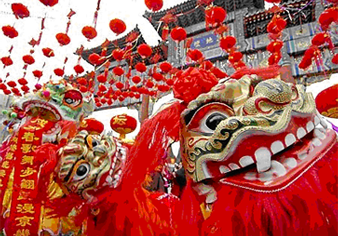
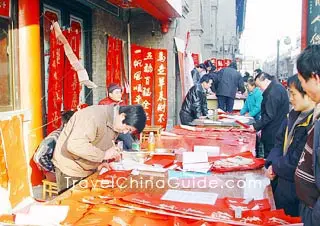
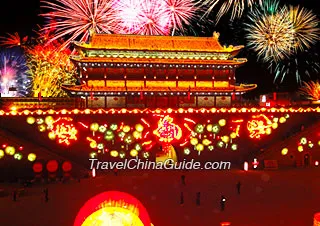
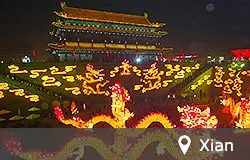
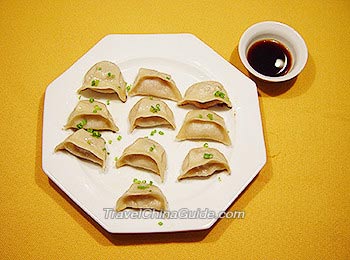

No comments:
Post a Comment